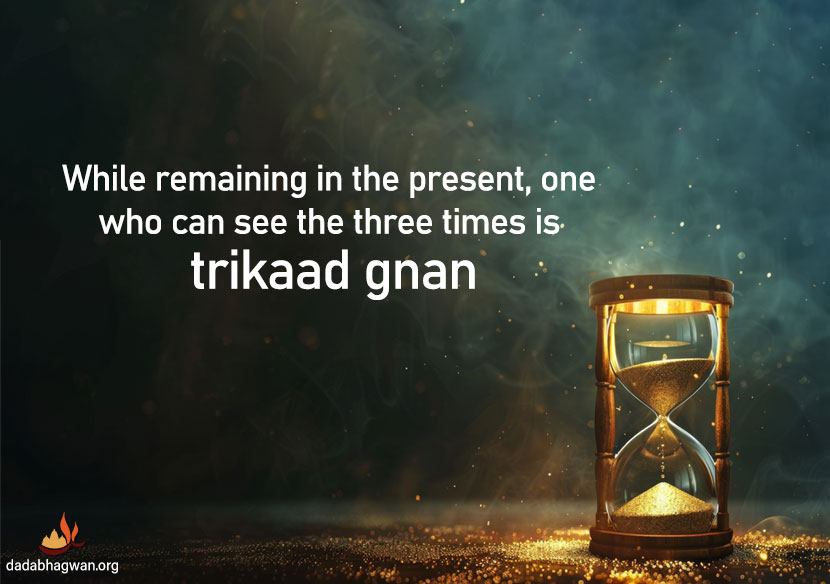What does Trikaal Gnan mean? Does the Omniscient One know all the phases of the past and the future?

While Remaining in the Present, One Who Can See the Three Times is Trikaad gnan
Questioner: Tell us the true definition of trikaad gnan?
Dadashri: Knowledge of something during three times: past, present and future, about its state in three times is called trikad gnan. What it was in its past, what it is in the present and what will happen to it in the future; he has such knowledge. That is called trikad gnan.
People understand trikad gnan as, that what happened in the past, what is happening now, and what will happen in the future, he can see even that. Is that not what they say?
Questioner: Yes, correct, that is trikad.
Dadashri: But it is not like that. Can there be at-a-time (all at the same time) the knowledge of all three times? Did you understand that through your buddhi (intellect)? If you understand through the intellect, then future is considered present, is it not? If you can see all the three times right now, then what time is it considered?
Questioner: The present, you are right.
Dadashri: It is indeed considered the present, is it not? It is considered the knowledge of the three times, but how is that knowledge of the three times? Trikad gnan is such that if you see something to-day e.g in the case of a wedding say it is an earthen pot, presently it is a pot. Right now when you see a pot, it is a gneya (thing being known). Now, what was this pot in the past, what was its main phase, tell me about that knowledge (gnan)? It was in the form of mud. Then a potter took that mud, wet it, spun it on a potter’s wheel and created a pot. Then he cooked it (in a furnace), sold it in a market, and it is what you see now. So if one asks, what will happen to it in the future? The pot will break, and then it will be in small fragments which will gradually wear down into mud again. Hence, in the present, both past and the future can be described. One can show all the phases, phases of the past and phases of the future. Hence, that which can tell you the past state and the future state of anything, at present, it is called trikad gnan.
Reference: Book Name: Aptavani 14 (Part 3) (Page 273 - Paragraph #1 to#7, Page #274 - Paragraph #1)
That what knows the past and future is the present
Questioner: Does Omniscient Lord know the phases of the past and the future?
Dadashri: Like he can see all the phases of the present. Krupadudeva has explained it very well. He (the Omniscient Lord) knows that, in one samaya (tiniest moment of time) these phases were like this, He also knows that these phases will become like this, and He also knows that what they have already become.
Therefore, the Omniscient Lord knows all that at one time, then there is no future or the past there, it is all present.
Questioner: Yes, for Him it is just the present.
Dadashri: Therefore, he cannot see the future in the present, and so then he said that this is how the tirthankars saw, that this vessel he saw today was mainly like this, from which it became this, it became this, the phases will change like this till it becomes dirt. Such is the case with living beings. So He knows all the phases.
Questioner: Does a Tirthankara know all the phases of existence of every living being?
Dadashri: Yes.
Questioner: Do they know everything about whatever they focus on with their enlightened vision?
Dadashri: Once they see a thing, they can tell all the phases, how the phases were before and how are they going to be from now on. They have constant vision as the fully enlightened Self (upayog). Absolute knowledge—keval Gnan means to see with this pure elemental vision (tattva drashti--to see the five other eternal elements as they are from the perspective of the fully enlightened Self). This is shuddha (pure) upayog, complete shuddha upayog.
Questioner: But that vision is not on others, no? That vision is of the Self (swa-bhav—being the Self).
Dadashri: That verily is the Self—swabhav.
Questioner: So then, are all the phases and aspects of everything else reflecting then, in that state?
Dadashri: That is the state of absolute enlightenment (keval Gnan), where all phases are known (to the knower) and that is pure upayog (the vision of the Self).
Questioner: Accepted, but, know whose phases? And when?
Dadashri: There is no effort to know anything, so (the Self) only knows. Without any effort (sahaj swabhaave), the Self knows all the phases of anything, how they were, and how they will be. Now if we try to dig deeper into this to create a new meaning (with the intellect), then we will spoil it all.
Reference: Book Name: Aptavani 11(P) (Page #212 - Paragraph #2 to #9, Page #213 - Paragraph #1 to #6)
subscribe your email for our latest news and events





